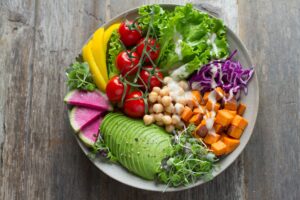Why vegetarian?

Although most people enjoy their meat-based meals, some have also decided to go vegetarian or vegan because they can’t handle the thought of harming animals or seeing any living creature go through pain. Also, there are others who follow this diet for health benefits.
Well, there are certainly countable perks of going vegetarian. According to evidence-based research from the Academy of Nutrition and Dietetics, people who eat plant-based foods are less likely to go through heart diseases, high blood pressure, and type 2 diabetes. They also tend to have a lower risk of developing cancer and other chronic diseases.
People living in India, Sri Lanka, etc prefer plant-based foods over meat, not only because of moral values but they find it healthier. According to Ayurveda, healthy plant-based food is the foremost factor to avoid half of the ailments. It’s not like Ayurveda defies meat but it assuredly gives preference to a vegetarian diet.
Why are vegetarians healthier than non-vegetarians?
Plant-based foods are rich in fiber which improves digestion. Actually, humans’ intestinal tracts are longer, like those of herbivores. So, the body takes more time to break down fiber and absorb the essential nutrients from plant-based foods.
Carnivores have short intestinal tracts which allow raw meat to pass quickly through their digestive system. When a human being consumes more meat, which means too much protein and that results in other nutritional deficiencies and poor intake of fiber.
Humans can’t rely on their weak stomach acids to break down raw flesh and other bacteria, unlike true carnivores. But they have enough acids to digest pre-chewed fruits and vegetables. Hence, meat may sometimes cause food poisoning if it is not cooked properly at a certain temperature.
Benefits of being a vegetarian:

As the saying goes, one should lead a life close to nature if he/she wants to avoid an unhealthy lifestyle.
1) Improves skin: Vegetables that are rich in nutrients and contain strong antioxidants help to protect the skin from any cellular damage.
2) Promotes bone condition: Lacto-Ovo vegetarians meaning those who eat both eggs and dairy products had 18% less bone mineral at the age of 80 compared to meat-eaters, who had 35% less bone mineral.
3) Helps in weight loss: Avoiding non-veg food (rich in protein and vitamins) helps to control weight. A vegetarian diet is not so rich in protein, meaning there won’t be any unnecessary fat in the body, thereby, promoting weight loss.
4) Supports mental well-being: A human body requires immense nutrients and a well-balanced vegetarian food keeps your mind positive, sharp, and focused. Fruits and green vegetables are particularly considered in this diet.
5) Lower the risk of chronic diseases: People who follow a plant-based diet are shown to have a lower risk of developing diseases like heart complications, high blood pressure, asthma, cancer, diabetes, arthritis, etc. This is because non-vegetarian foods are processed with excess oil and also too much protein is harmful to the human system.
6) Longer life expectancy: It has been published in various research that vegetarians live about 7 years longer than meat-eaters. The reason for this is that most vegetarians are engaged in physical activities, less likely to go through chronic diseases, smoke, and drink less – all these factors contribute to a long and healthy life.
7) Improves metabolism: Plant-based foods are easy to digest and it keeps the metabolism in a good state. The RMR (Resting metabolic rate) of a person with a plant-based diet is quite higher than that of a non-vegetarian. That means, the higher the RMR, the more efficient our body is to burn fats.
Related: Tips for a Healthy lifestyle
